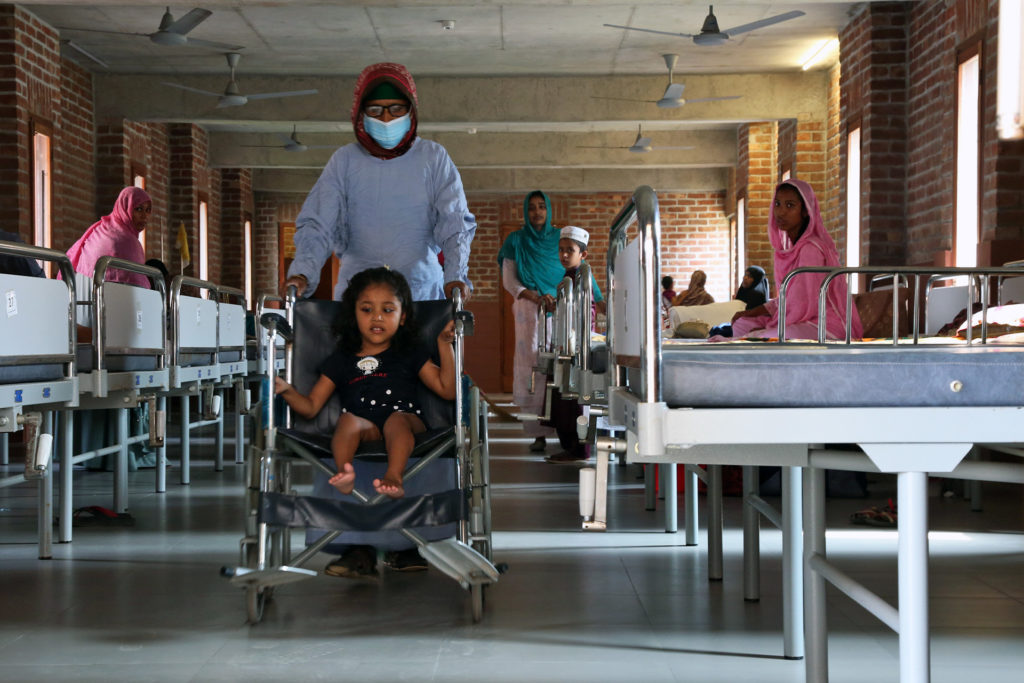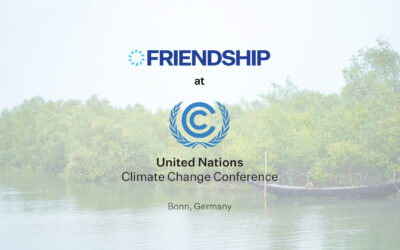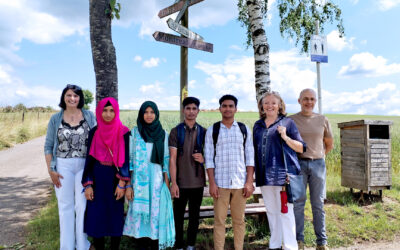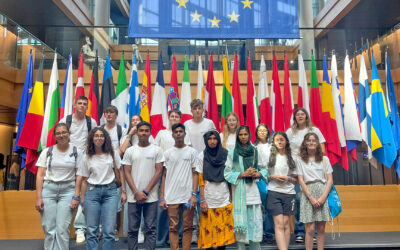An orthopaedic camp at Friendship Hospital Shyamnagar brings hope and opportunity to children in the climate-vulnerable coastal belt

by NAUSHAD ALI HUSEIN
March 31, 2022
Letting her grandfather’s finger slip from her grip, Gerin runs unsteadily down the promenade past a grassy courtyard, on her tiptoes. She beams like it’s a game. But you eventually realise, she can’t flatten her feet.
Further down, 8-year-old Sadika is inconsolable as the nurse wheels her through a pair of swivel doors labelled “pre-operative.” Years of encounters with hospitals and doctors have left her embittered, and she just wants to get away from all these needles and gowns.
But it’s a big moment for her family. Sadika was born with deformed ankles. In this border district of Satkhira, in the coastal belt of Bangladesh, orthopaedic surgery is hard to get.

At the Friendship Hospital Shyamnagar (FHS), winner of the recent RIBA Prize for “best new building in the world,” Sadika has her chance. Her walk is about to be transformed.
From March 21 to 27, doctors are seeing more than a hundred patients and conduct 25 surgeries as part of an orthopaedic surgical camp at FHS. The surgeries can’t entirely fix the problems. But they can significantly ease a patient’s mobility. A timely and effective surgery could enable a child to play, fit in, and develop in step their peers.
World’s best children in the world’s best building
In the ‘camp ward,’ Siam Hossain is the least worried about the upcoming procedure. His father, Mohammed Sirajul wants to show off his recitation, and the boy is eager to oblige. He happily prattles off rhymes in Bangla and English.
“I haven’t been able to advance my career much,” says Sirajul, a teacher. “I have dedicated everything to improving his condition.” Later today, doctors will modify the tendons in both of Siam’s feet, and his hip. Perhaps in a few months he will move as elegantly as he rhymes.
Across the aisle, Maharima charms everyone with her sunny disposition. She was born prematurely only six months after conception. Four years on, the consequences are still apparent in her slightly crossed eyes, and in her speech. But at this age, her distinct pronunciation is endearing, and wins everyone over. The most obvious symptom is one she shares with all the other patients in the room—her hobbling walk. “When she sees other children play, she wants to join them,” says her mother. “How do I tell her that she can’t?”
Children with congenital disabilities are often isolated by their inability to play with other children. “I’ve had this problem on my left foot since childhood,” says Lamia Sultana, 19, awaiting a bilateral Achilles tenotomy—while her siblings amuse themselves by jumping from bed to bed. “As I grew older, I started feeling conscious about my problem in front of my peers. I feared getting bullied and felt embarrassed.”
These conditions are often linked with developmental issues during childbirth. The sooner the intervention is made, the more effective it is.

A Light of Hope
Friendship began 20 years ago with a floating hospital bringing healthcare to river islands of northern Bangladesh. That project has grown and evolved into a three-tier healthcare system accessible to 7 million people in the most unaddressed regions of the country.
Surgical camps in these areas ensure that even in areas where doctors are unavailable people can get the procedures they need. In March 2022, Friendship has had eight camps at the organisation’s two floating and one mainland hospital, including visceral, gynaecology and cataract camps, completing 217 surgeries and 591 consultations. The floating hospitals in the north provide services free of cost.
Friendship Hospital Shyamnagar opened its doors in 2018, and was part of a range of broader interventions in healthcare, climate action, sustainable economic development and education in the cyclone- and salinisation-impacted coastal belt of the country. “We have found that many patients return with their relatives, and they wait for future camps,” says Ashim Rozario, assistant general manager at FHS. “This is an indication of the demand in this area.”
Many patients have also been referred by organisations like Rishilpi International Onlus—an organisation that works with disabled and otherwise marginalised people through healthcare and education.
“Our patients have been waiting since the last orthopaedic camp at Friendship’s hospital (in 2019) to get operated,” says Mehedi Hasan, manager of Rishilpi’s health program. “It is not easy to get surgeries done in this region. We have referred our patients to many facilities, but from this hospital, they invariably return with excellent treatment.” Rishilpi brought more than 70 of their patients to FHS on the first day of the camp.
“In this southern region of Bangladesh, we found that there are not many specialised surgeons, especially for orthopaedic and reconstructive surgeries,” says Ashim. “We found that patients in this region go to Dhaka or Khulna. A lot of patients had been to India and returned because of the prohibitive cost of treatment.”

Several families at the camp have made multiples medical trips to India, spending about 150,000 taka (1,500 euro) each time. At FHS, two surgeries along with associate costs amount to about 7,000 taka (70 euro).
On Thursday, the day after her surgery, Sadika finally cracks a smile, despite the needle in her left hand. She has received a remote-controlled toy car. “Nothing cheers her up more than gift from her father,” says Sadika’s mother. “She’s daddy’s girl.”
The doctors have scribbled on her plaster “4 weeks”: the time Sadika must wait till the last traces of her hospital encounter are finally removed.
With additional reporting by Tahmeed Chaudhury.



